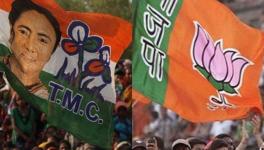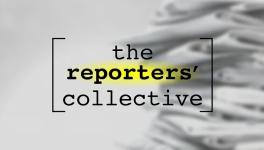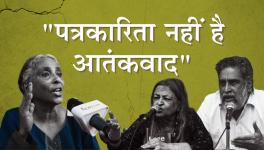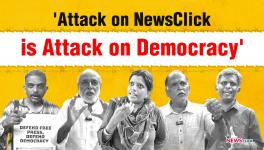Why Indian Journalists Must Read this German Strategist

Image Courtesy : YouTube
Johannes Hillje is a political and communications consultant in Berlin and Brussels. He advises a range of institutions, political parties and companies on communications and framing. In 2017, Hillje published Propaganda 4.0 - How Right-wing Populists Make Politics. In an interview, he explains how journalists can avoid using the language that the Right and populist leaders deploy. Edited excerpts.
What is ‘framing’? How does political framing work?
Framing is a process in communication through which a certain meaning is ascribed to an issue. It takes place on both sides of the communication, the sender and the recipient. Political framing is a technique that is used to influence the direction of a political debate and the attitudes of people [towards an issue] by using language.
Framing can draw focus on to certain aspects of an issue in order to conceal a larger phenomenon. The issue of foreigners [immigration] is very big for the [German political party] Alternative for Deutschland (AfD). AfD is framing the foreigners issue by saying that they are here illegally, have no right to be here, and that they are a security threat, they commit crimes, and are a burden on the welfare system. So, they frame the idea of a foreigner in a completely negative way.
The other aspect of how AfD is framing immigration is through the lens of the Muslim. They say that the Muslims are bringing their culture and religion here, that conversion is going on which will make a Christian Germany into Islamic Germany, and that our religious and cultural norms will be completely changed. They call it Islamisation. They activate the ‘rapist’ frame when it comes to North African men. This is very much built on the sexualised stereotypes of African men...
What words, and what meaning, does your analysis of AfD’s language and framing reveal to you?
[I find that] they use a highly discriminatory framing against migrants, Muslims and other minorities, mostly by creating an “us” and “them” division. In doing so, they are breaking the fundamental values and rights of the German constitution.
Does our brain work in ‘frames’? Is it possible to think or communicate without framing?
Everyone who wants to understand or be understood uses framing. It is a cognitive tool to understand the world. Frames activate our personal experiences, values or emotions. However, we have to be very careful when it comes to the effects of framing. There is not enough evidence to claim that framing changes the attitudes or even behaviour of people.
When does it become problematic?
In the political discourse, framing becomes problematic when it is used to manipulate or discriminate between people. Politicians should frame issues effectively. That is, they must speak in simple language and speak to values and emotions. They may use metaphors but should not become dishonest or turn against a section of society.
What kind of political outfits use framing more: ones to the Left or the Right? Are the metaphors and terminologies they use different?
Both sides use framing, but in different ways. That is because the values of the Right and Left are different. Framing is effective when it addresses the values of the supporters.
Does framing work equally for everyone?
No, framing effects can be very different.
Is it possible for voters to not be manipulated by how politicians frame issues?
Voters should always ask themselves if a certain term or word is appropriate to describe a problem.
It is often said that the language once used by the Nazis is returning to the mainstream in Germany. Could you illustrate this view?
There are many such examples, but one is a term that refers to the political elite or an established political party. I am referring to the term Altparteien, which means ‘old party’, but then it means more than just an old party. It means ‘too old’. This term was coined by [Nazi leader Joseph] Goebbels and it is constantly being used to send the message that the old parties are not just old but also useless and unable to respond to the current challenges, that we cannot rely on them anymore and, therefore, need something new.
Could you give an instance of positive framing as well?
Say, we are talking about migrants. I can frame you as a migrant and as someone who comes to Germany with the skills of a journalist, a specialist, someone who adds value and as someone from a different cultural background. I can say that you enrich our economy with your skills and that you can work here while also enriching our country by bringing with you some aspects of culture that many Germans do not have. This would be a more positive framing.
How then does one know when framing is promoting a political agenda?
Framing is not evil in itself. My definition of framing is neutral, that it is a communication technique used in politics. I use framing myself when I work for politicians and we frame political agendas. Consider another instance of progressive framing. The Green Party in Germany stopped using the term “climate change” a couple of years ago. They now call it a “climate crisis”. They call it a crisis because “change” is actually a positive term from the viewpoint of progressive people.
Remember [former United States President Barack] Obama? Change was his big term. Therefore, change was not the right word to frame the potential danger and threat from climate change. “Crisis” signals that you have to act now, a state of emergency in a way. Therefore, it is important for journalists, also for ordinary people, to know that politicians are using framing when they talk about their agenda.
What can other political parties learn from the Greens and the AfD?
Other political parties need to find convincing frames for themselves. We have seen in the past that they copied the populists on the Right. They are also using anti-immigration framing, which shifted the whole political discourse to the right. I mean, AfD is still there. The Christian Democratic Union (CDU) did not improve in the elections. The Social Democratic Party (SPD) is almost dying. So, at the moment, the big parties are on the back foot.
The only party that found a counter-narrative of its own is the Greens. Of course, they are at the opposite end of the political spectrum, but they did find their own language for their positions. They did not copy the populists on the Right. This is what other parties need to do, offer a different narrative, a different framing.
How should journalists report on the frames or narratives that political parties build?
If journalists use terms such as “waves of refugees”, then it has implications for the political discourse. “Wave” is a metaphor for threat or a natural disaster. Framing immigration in this way will lead to more discussions about ‘security for the home population’ rather than the migrants. If there is a ‘wave’ of migrants, then you will not be able to do anything about sorting out the root of the problem. Say, there is Tsunami. Well then, there is a Tsunami. You can only do something about the symptoms of a Tsunami—you can make sure your people move to secure places or build dams and walls. This is exactly the discourse we have had in the past year. The reason is these metaphors of migration being a threat or natural disaster. A journalist has to make sure that even when using frames—which one cannot avoid—they still ensure a balance in the political discourse. The political agenda always comes from a political party, which means that it is not balanced. The journalist’s job is to ensure there is balance.
In India, a group of people are being called infiltrators, invaders, termites and so on by the Right. Could you comment on what these words or such framing denotes?
This is similar to the migration debate in Germany. A whole group of people is framed as a threat to the rest of the society. It is a way to divide society into a “we” and “them”, to polarise society, because polarisation means mobilisation. It is a trick to make people vote for you.
What reasons do you see for the rise of populism?
There are no easy answers, and no one answer. The success of populist parties is based on the wrongdoings of the other parties who ruled before. At least in the beginning, when populist parties come up, they do not get [popular] support because of their agenda. They mainly get support because people are dissatisfied with [other] parties. This is only one element of the explanation. Certainly, there are people who vote for populists because they feel economically left behind. Some people feel culturally threatened by small changes in our societies because of globalisation, digitalisation, migration… I can say for Germany that the common characteristic of voters of the AfD is that they are feeling insecure.
Why is this so?
They feel insecure for they are afraid of the future. This fear can be based on cultural fears, economic fears and many other reasons. But, first, there is an insecurity and that makes [people] sort of lean towards populism.
AfD started as an anti-Euro party then changed to anti-migration. How do you see their politics?
First anti-Euro, then anti-migration and now anti-climate agenda. Their agenda always goes against the, let us call it mainstream agenda, or the agenda of established political parties. So, they always try to materialise the dissatisfaction of people against political elites. When it comes to climate [change], they are also against science because the academia can be seen as a part of the elite.
It is not as if their voters are always against migration per se, or even Europe per se. But they always [find] a way to scapegoat [some section or issue]. Scapegoating helps find an easy reason for why things are not great in your life. Maybe someone thinks that they don’t earn enough in their job and this can be a very justified reason to be unhappy. Then [if] they see the state take in a lot of migrants and shelter refugees, of course, this can be perceived as unjust. I mean, it is way too easy to blame the migrants for the situation in your life, but these are the easy and over-simplified arguments that the populists are making.
Is this how the Right builds an emotional bond with their followers?
One part of their strategy is to build collective identities. You construct a collective identity by defining an ‘in’ group and an ‘out’ group. We versus Them. Us versus Them. This is what they are basically very good at.
On migration, the German population is the “us” versus the outsider [immigrant] coming to our country, using our welfare system, threatening our population and so on... This is a very emotional way of doing politics because group identification is very important and plays very well as a strategy. They convey a sense of belonging to their supporters and also make the discourse emotional by claiming, for example, that our culture, our security, are under threat. This creates fear and negative emotions. If you put voters in a state of fear, they might not even think rationally but react against their fears.
How do political parties construct their narratives?
They create their own media channels, mostly on social media, where they are very effective. They have more Facebook fans than CDU and SPD together. AfD was on top of its communication strategy even before the parties [started making their strategies]. One trick they used was constantly saying that the traditional media is lying. They spread the idea of Lügenpresse (“the lying press”) as a way of framing the discussions on media. [This lying press idea has been used for a long time. It was also used by Nazis in Hitler’s time]. If you buy the Lügenpresse argument then, of course, you will need a source for the truth. This is where they come in with their communication channels. They say that ‘we have the truth’ while the others are lying. This strategy they have been pieced together very well indeed.
Aaquib Khan is an independent journalist based in Mumbai. He is currently in Germany as a Robert Bosch Stiftung Media Ambassador.
Get the latest reports & analysis with people's perspective on Protests, movements & deep analytical videos, discussions of the current affairs in your Telegram app. Subscribe to NewsClick's Telegram channel & get Real-Time updates on stories, as they get published on our website.























